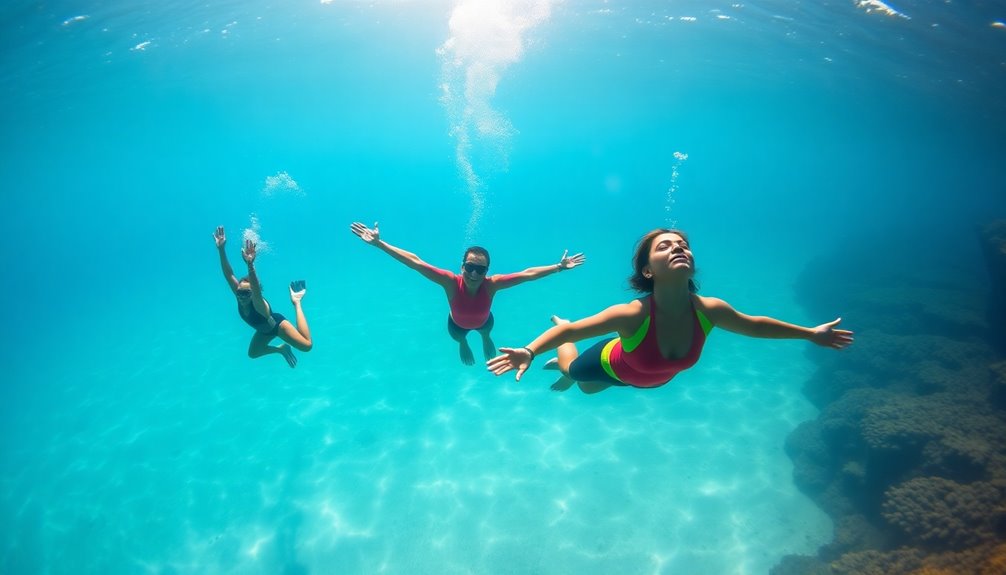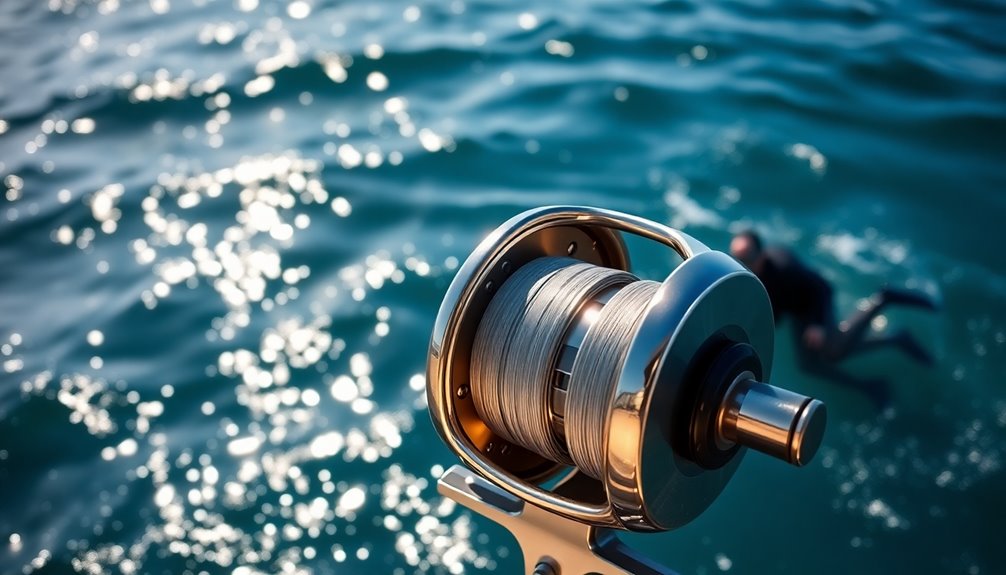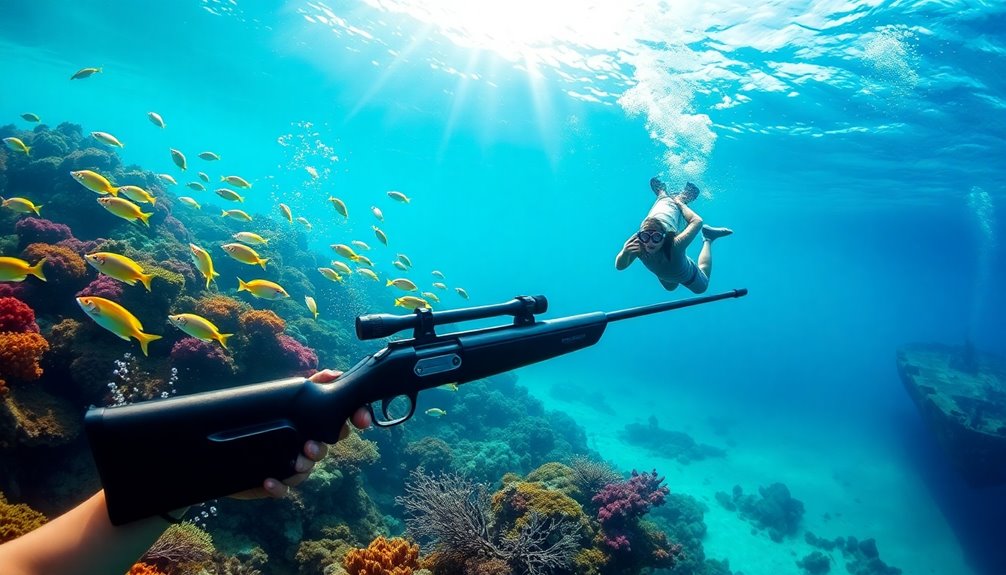Looking for freediving classes near you? You're in luck! Many local options help you dive deeper, stay longer, and breathe smarter. Classes teach you essential skills like safety, breathing techniques, and equalization. You can start from beginner levels and even work up to advanced mastery. Dive shops like Evolve Freediving and Aquarius Dive Shop offer personalized learning experiences. With the right equipment, plus guidance from instructors, you'll explore stunning underwater worlds in no time. So, get ready for a thrilling adventure, and you'll discover even more about what freediving can offer!
Key Takeaways
- Explore local classes from Evolve Freediving, offering summer courses in the U.S. and winter sessions abroad for all skill levels.
- Join personalized training at Aquarius Dive Shop in Monterey for tailored instruction and hands-on learning experiences.
- Sign up for scheduled classes at Deep Freediving in Honolulu from December 13-15 to enhance your freediving skills.
- Contact East Coast Divers for specific dates on the East Coast, focusing on foundational skills and safety practices.
- Choose Bay Area Freediving for customized coaching sessions designed to elevate your freediving journey and performance.
Understanding Freediving Levels

Freediving levels provide a structured path for divers to enhance their skills and safety as they explore the underwater world.
When you start with Level 1, you'll learn the basics of freediving. You'll spend time in classrooms, pools, and open water, focusing on safety and improving your techniques. You can dive to a depth of 20 meters (66 feet) while mastering breathing techniques and equalization. This level also emphasizes safety protocols to ensure a secure diving experience.
After completing Level 1, you can move on to Level 2. Here, you'll dive deeper, reaching up to 40 meters (132 feet). You'll learn advanced equalization techniques to help avoid injuries. You'll also practice breathing exercises that boost your dive reflex.
If you really want to challenge yourself, Level 3 is for you. This master's level dives down to around 32 meters. You'll create your personal training program, learn advanced techniques, and even focus on nutrition for better performance.
As you progress, remember to master the shallower depths first. Freediving is about building endurance and confidence.
Enjoy the journey, and you'll discover the incredible beauty beneath the waves!
Essential Safety Practices

Diving safely requires a solid understanding of essential safety practices that can make all the difference in your underwater experience.
First, always dive with a buddy! Choose someone who's equally skilled and knows safety procedures. When you dive, remember the rule: one up, one down. Never dive at the same time as your partner, and keep a close eye on each other, especially for 30 seconds after surfacing. Having a buddy can provide critical emergency assistance in case something goes wrong.
Next, focus on breathing and recovery techniques. Avoid hyperventilating before your dive. It can lead to blackouts! Instead, take three recovery breaths after each dive. This means a quick exhale, a deep inhale, and then hold. Also, don't exhale before reaching the surface; it helps you stay buoyant.
Lastly, be mindful of your equipment and dive planning. Make sure you're correctly weighted so you float at the surface and check conditions like weather and visibility. Always create a dive plan, so everyone knows their role. And remember, don't push your limits—maintain a reserve.
With these essential safety practices, you'll have a safer and more enjoyable freediving adventure!
Key Training Components

To excel in freediving, mastering key training components is essential. First, you'll want to focus on specific goals and techniques. This means practicing your overall skills, using dry, wet, and cross-training exercises. Training away from your personal bests helps build a solid foundation.
It's also crucial to incorporate breathing techniques, like diaphragmatic inhalation and restricted breaths, to improve your performance.
Next, identifying and addressing your weaknesses is vital. Tailor your training to tackle these areas head-on. You can simulate breath-holding in a pool with interval training and practice equalization techniques like the Valsalva and Frenzel maneuvers. Gradually training your body to handle high CO2 and low O2 levels will make a big difference, as effective base training prepares you for advanced freediving challenges.
Don't forget about building your general health and fitness! Engage in strength and conditioning exercises, add cardio and endurance activities, and focus on core strength for better stability.
Finally, use relaxed breathing techniques to keep your heart rate low. Longer exhalations can help calm your body.
Managing Depth and Time

As you refine your skills and build your foundational techniques, managing depth and time becomes increasingly important in your freediving journey.
You'll start by exploring depths of 0-20 meters, where you'll face your fears and practice equalization techniques like Valsalva and Frenzel. Pool training helps your body adapt to the underwater world, improving comfort and CO2 tolerance.
Once you reach 20-40 meters, you'll unlock the full potential of recreational freediving. Here, you'll continue perfecting your equalization and might begin to think about gear, like carbon fins.
As you dive deeper, from 40-55 meters, you'll learn mouthfill techniques, ensuring you manage your air efficiently. It's essential to remember that adequate rest helps support muscle repair and neurological recovery, enhancing your performance during these deeper dives.
When you progress beyond 55 meters, managing hypoxia and understanding your body's limits becomes crucial. You'll need to recognize your physical and mental states to dive safely.
Remember, it's vital to balance your dive frequency, taking up to two rest days between dive days. This keeps your body happy and ready for the next adventure!
With proper breathing and relaxation techniques, you'll dive deeper, stay longer, and breathe smarter, making your freediving experience even more exciting!
Choosing the Right Equipment

Selecting the right equipment is essential for a successful freediving experience.
First up, freediving fins! Look for fins with long blades, which help you glide through the water with ease. A full-foot design is comfy and gives you better propulsion. You can choose between bi-fins, which are great for maneuvering, and monofins, which offer fantastic speed. Monofins are specifically designed for excellent propulsion, which is why they are used in record-setting freediving attempts.
Next, consider a wetsuit. Open cell suits are warmer and more flexible, but they can be tricky to put on. Pick a thickness that suits the water temperature; options range from 2mm to 6.5mm. High-quality Yamamoto neoprene is a good choice for warmth and durability.
Don't forget about masks and snorkels! Low volume masks make equalizing easier, while simple snorkels allow you to breathe comfortably with your face in the water. The Aqua Lung Sphera X is a top-rated mask.
Finally, invest in a rubber weight belt to help you stay balanced while diving. You can rent equipment if you're unsure what to buy.
With the right gear, you'll dive deeper, stay longer, and have an amazing time underwater!
Available Certification Options

When you're ready to take your freediving skills to the next level, exploring available certification options can be a game changer. You've got some exciting choices!
AIDA is a popular option, founded in 1992. It offers courses from beginner to advanced levels, focusing on safety and technique. You'll learn breath-hold techniques, equalization, and even advanced skills like free immersion diving. AIDA certifications are widely respected and recognized globally in the diving community.
PADI is another great choice, part of a vast network of dive centers. They build strong foundational skills and safety practices, ensuring you’re well-prepared for underwater adventures. You’ll cover breath-holding and dynamic apnea, with advanced courses requiring rescue skills. With their comprehensive curriculum, PADI equips divers with essential knowledge about freediving equipment and accessories, enabling you to make informed choices that enhance your diving experience. Additionally, their expert instructors provide invaluable tips on how to maintain and care for your gear, ensuring longevity and performance during your underwater excursions. By emphasizing safety and skill development, PADI prepares you for an exciting and rewarding journey into the depths of the ocean.
Molchanovs, founded by Alexey Molchanov, emphasizes education and performance. Their structured system includes theoretical knowledge and in-water practice. You'll focus on physical and mental training, which is super important!
SSI combines online training with pool sessions and open water dives. Their courses cater to all levels, covering essential skills and safety protocols.
With each certification, you'll gain confidence and knowledge, making your freediving journey even more enjoyable. So, take the plunge and choose the certification that excites you the most!
Finding Classes Near You

Finding the right freediving class near you can significantly enhance your skills and confidence underwater. Start your journey by checking out local centers like Evolve Freediving, which offers courses in the U.S. during summer and abroad in winter. Additionally, Evolve Freediving provides a variety of certification courses that cater to both beginners and advanced divers.
If you're in California, don't miss the Aquarius Dive Shop in Monterey. They provide private courses, so you can learn at your own pace!
For those in Hawaii, Deep Freediving in Honolulu has scheduled classes, like from December 13-15.
On the East Coast, East Coast Divers are available, and you can contact their training department for specific dates.
In the Bay Area, Bay Area Freediving offers tailored coaching and sessions, too.
Each center has expert instructors. Evolve Freediving features a world record holder, while East Coast Divers are led by a top training director.
Safety is key in all classes, with buddy systems and personal equipment requirements in place.
Frequently Asked Questions
What Are the Age Requirements for Freediving Classes?
When you're looking to join a freediving class, age matters!
For entry-level courses, you can start as young as 10 or 12, depending on the program. If you're 15 or older, you can dive into intermediate and advanced courses.
Just remember, parental consent is needed for minors.
Can I Take Classes Without Prior Swimming Experience?
Yes, you can take classes without prior swimming experience! Many beginner freediving courses welcome new swimmers.
While some swimming skills help, you don't need to be an expert. Instructors focus on teaching you from the ground up, so you'll learn everything you need.
They'll guide you through the basics and build your confidence in the water. Just bring your enthusiasm and a willingness to learn, and you'll have a fantastic time!
How Long Does It Take to Get Certified?
Getting certified in freediving usually takes a couple of days.
For example, the FII Level 1 Freediver course is a 2-day program. You'll spend time in class, practice in the pool, and dive in the ocean.
Other courses might take a bit longer, but they all focus on teaching you essential skills.
What Should I Bring to My First Freediving Class?
When you head to your first freediving class, it's important to bring a few key items.
You'll need a low-volume mask, long fins, and a snorkel for surface breathing. Don't forget a warm wetsuit and a weight belt.
If you have any safety gear, like floats or a dive watch, bring those too!
Also, make sure you get a good night's sleep before the class.
You're going to have an amazing time exploring underwater!
Are There Any Medical Conditions That Exclude Participation?
Yes, certain medical conditions can exclude you from participating in freediving.
If you have severe heart issues, untreated coronary artery disease, or major psychiatric disorders, it's best to check with a doctor first. Conditions like exertional chest pain or hypertension can also be concerns.
Don't worry, though! Many people safely participate after getting the right advice. Always prioritize your health, and make sure you're feeling great before diving into this exciting adventure!
Conclusion
Now that you know what it takes to start your freediving journey, it's time to dive in! Remember, practice makes perfect, and safety always comes first. With the right training, you'll learn to explore the underwater world like never before. So, grab your gear, find a class near you, and get ready for an amazing adventure. You'll not only breathe smarter but also experience the joy of diving deeper and staying longer. Happy diving!










